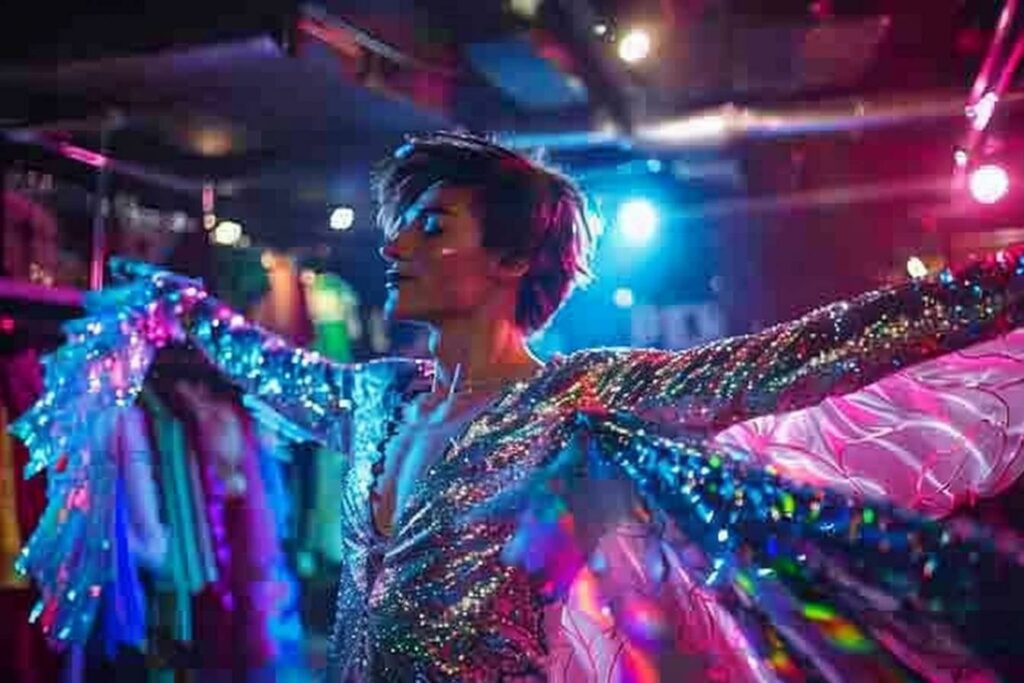Quick change costume is an interesting technique used in the world of show business. It allows performers to metamorphose in the blink of an eye, creating magical moments on stage. Let’s discover the secrets of this captivating art, which combines ingenuity, precision and speed.
The fundamentals of quick change costume
Quick costume change is based on several essential principles. First and foremost, meticulous preparation is the key to success. Every item of clothing must be carefully arranged for easy removal and quick fitting. Costume designers work in close collaboration with artists to design outfits suited to this technique.
The layering strategy is frequently employed. This involves wearing several layers of clothing one on top of the other, allowing a new costume to be revealed simply by removing the top layer. This method is particularly effective for spectacular transformations in record time.
The use of clever fasteners is also crucial. Costume designers prefer :
- Magnetic fasteners
- Velcro systems
- Snap fasteners
- Special quick-opening zips
These devices allow lightning fast undressing and re-dressing, without compromising the costume’s appearance on stage.
The choreography of change is an often overlooked but essential aspect. The artists and their assistants tirelessly rehearse the sequence of movements required to perform the change. This meticulous coordination optimizes every gesture and saves precious seconds.
Advanced techniques for breathtaking transformations
Beyond the basic principles, there are a number of advanced techniques for achieving even more spectacular metamorphoses. One of these is the reversible costume. Designed to be worn on both sides, it allows you to radically change your appearance simply by turning it inside out.
Another popular technique is the pull-tab suit. Invisible threads are strategically placed in the garment. When pulled, they trigger a mechanism that instantly changes the appearance of the costume. This method, popularized by the famous magician David Copperfield, creates the illusion of a magical transformation.
The use of innovative materials also plays a crucial role. Shape memory fabrics, for example, can be pre-folded to quickly unfold into a predefined shape. Thermochromic fabrics, meanwhile, change color under the effect of heat, enabling striking visual transformations.
Here’s a table summarizing the main advanced techniques:
| Technique | Description | Effect obtained |
|---|---|---|
| Reversible suit | Garment designed to be worn on both sides | Radical change of appearance |
| Pull-tab costume | Mechanism activated by invisible wires | Instant “magical” transformation |
| Shape-memory materials | Pre-folded fabrics that unfold rapidly | Sudden appearance of complex shapes |
| Thermochromic fabrics | Materials that change color with heat | Spectacular visual metamorphosis |

Tips for perfecting the art of lightning change
Mastering the art of the quick change costume takes practice and ingenuity. Here are a few tips on how to perfect this technique:
Simplifying silhouettes is essential. Costumes should be designed with streamlined shapes, making them easy to handle quickly. Complex ornaments or bulky accessories should be avoided, unless they are an integral part of the transformation process.
Space management is crucial. A dedicated change area, called a “quick change booth”, should be set up backstage. This space is organized to optimize every movement:
- Costumes are hung in the order in which they are to be used.
- Accessories are arranged in a logical and accessible way
- Adequate lighting is installed to avoid mistakes
- Strategically placed mirrors for a quick final check
Collaboration with technicians is essential. Costume changes are often synchronized with lighting, sound or smoke effects, masking the process from the audience while adding to the spectacle. This perfect coordination between artists and technicians creates moments of pure stage magic.
Finally,meticulous care of the costumes is essential. After each performance, the garments must be inspected, cleaned if necessary, and prepared for the next show. This routine guarantees the reliability of the mechanisms and prevents any potential malfunctions.
The impact of quick change in the entertainment world
Quick costume change has revolutionized the world of show business, opening up new creative possibilities for directors and choreographers. In particular, the technique has left its mark on Broadway, with iconic productions such as “Dreamgirls” and “The Producers”, where quick changes have become show-stopping moments.
In the world of magic, artists like Arturo Brachetti have elevated quick change to an art form in its own right. This Italian transformist is capable of changing costume over 80 times in a single performance, embodying a multitude of characters in a matter of seconds.
Contemporary circus has also seized on this technique. Companies such as Cirque du Soleil regularly incorporate it into their shows, creating breathtaking visual tableaux in which performers seem to metamorphose as if by magic.
The impact of quick change extends beyond the stage. The technique has also influenced the world of fashion, inspiring designers to create transformable or modular garments. It also has practical applications in fields such as film and television, where rapid costume changes are sometimes necessary for production reasons.
Ultimately, the quick change costume is much more than a simple technical feat. It’s an art that pushes the limits of creativity and illusion, offering audiences moments of pure visual magic. Its constant evolution promises many more surprises and innovations in the fascinating world of live performance.

